人教版必修二 Unit 1 Cultural relics语法Grammar课件(共45张 )
文档属性
| 名称 | 人教版必修二 Unit 1 Cultural relics语法Grammar课件(共45张 ) |
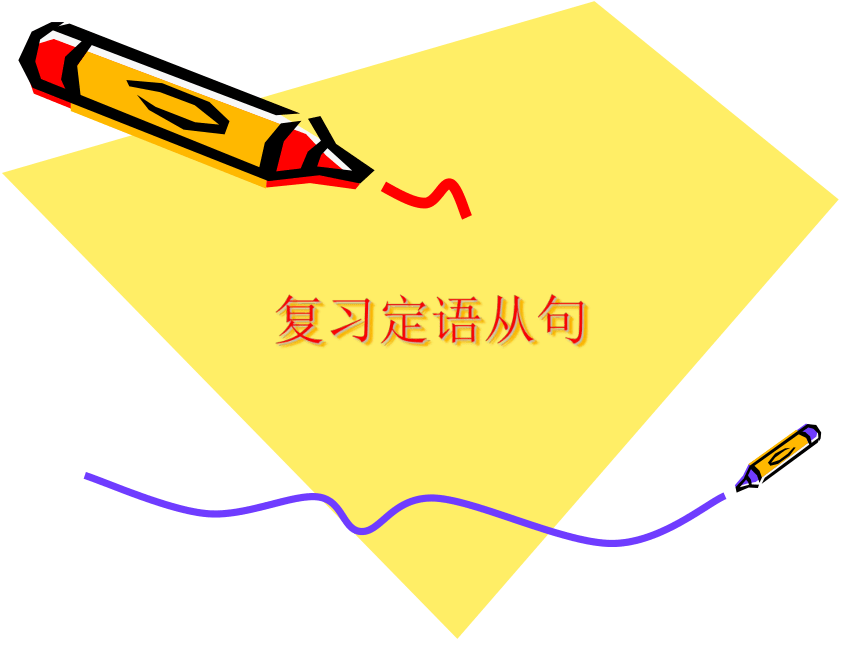
|
|
| 格式 | zip | ||
| 文件大小 | 249.3KB | ||
| 资源类型 | 教案 | ||
| 版本资源 | 人教版(新课程标准) | ||
| 科目 | 英语 | ||
| 更新时间 | 2019-01-23 00:00:00 | ||
图片预览

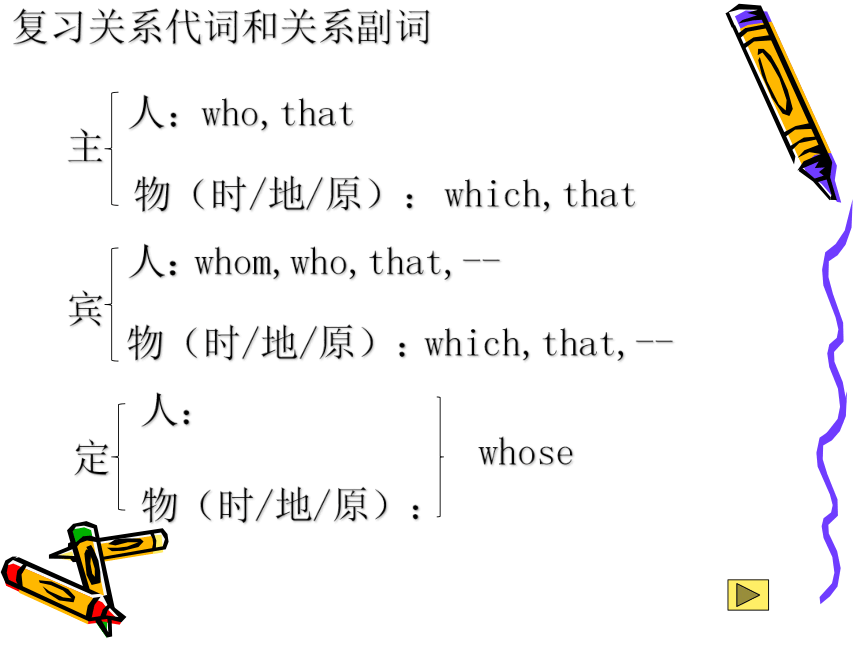
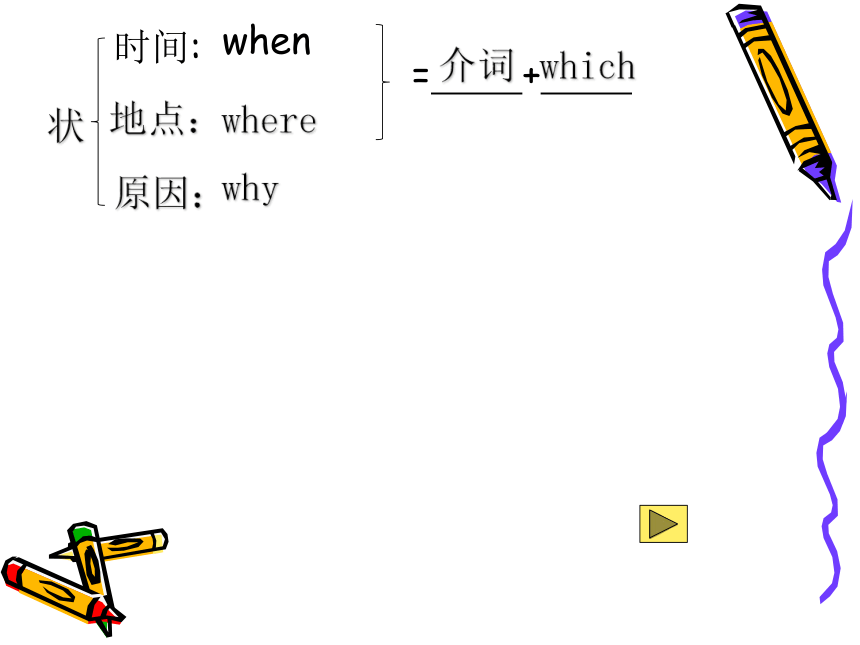
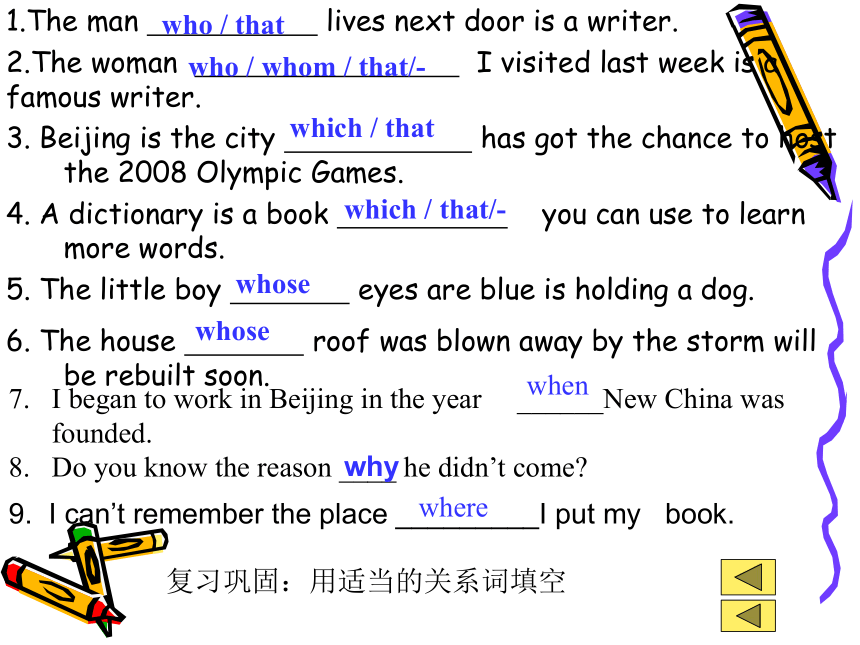
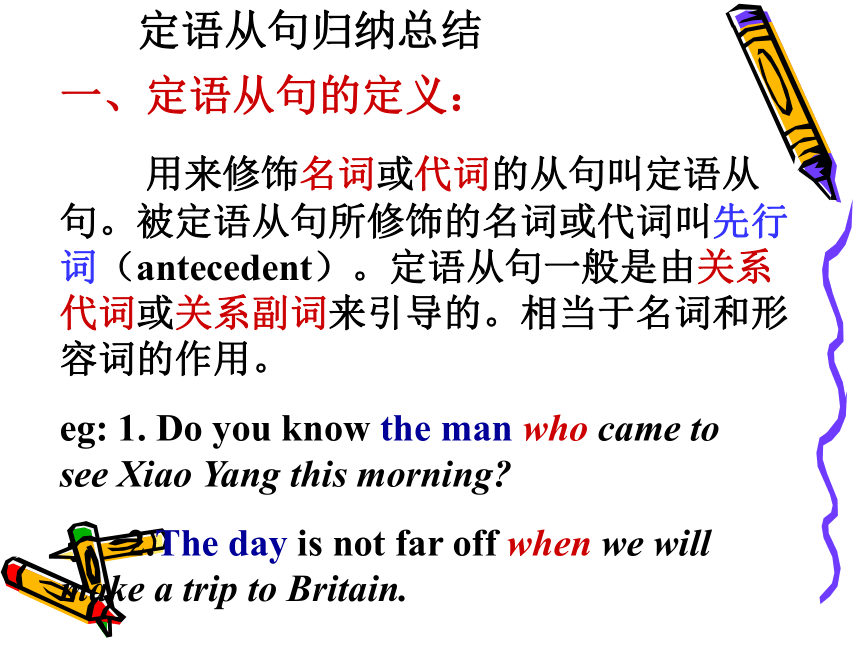
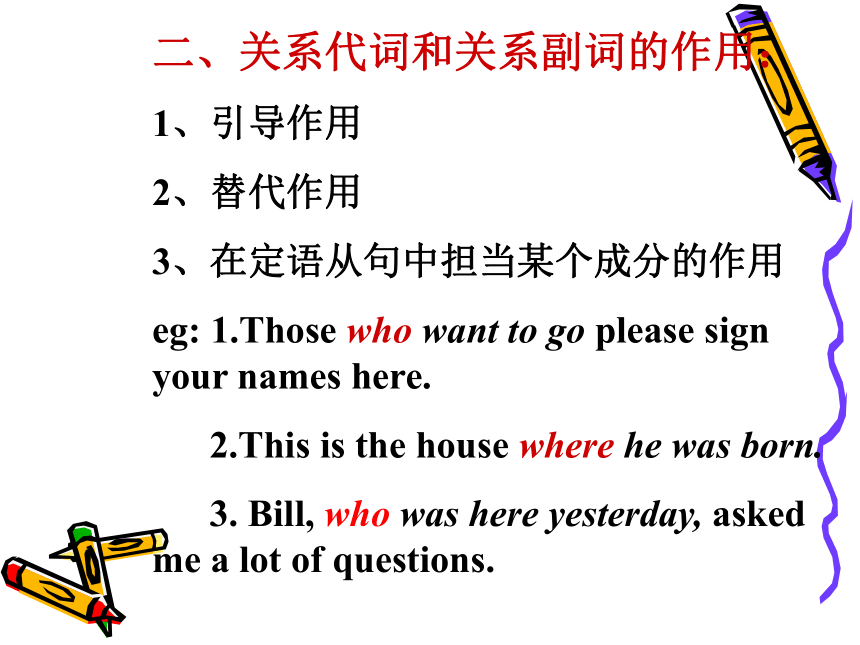
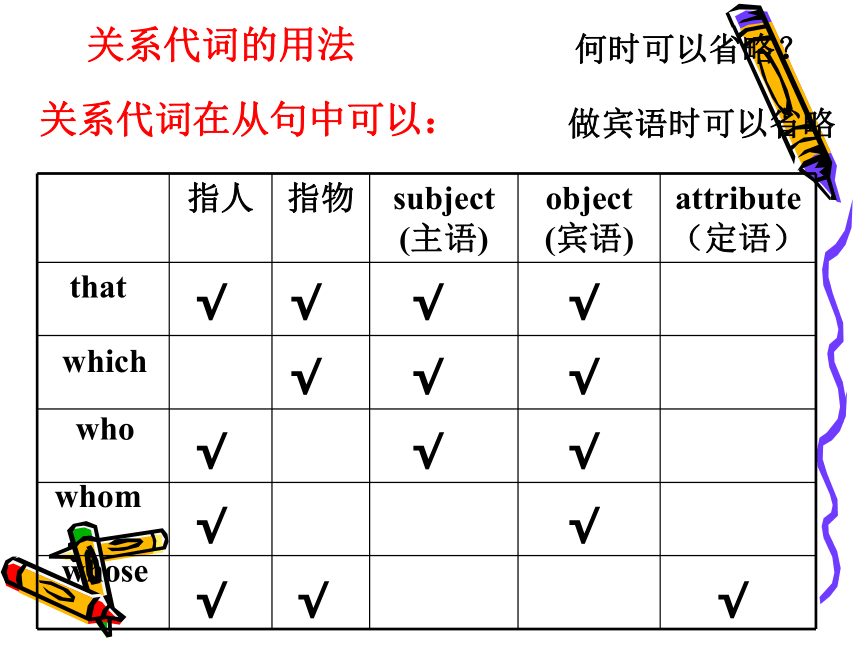

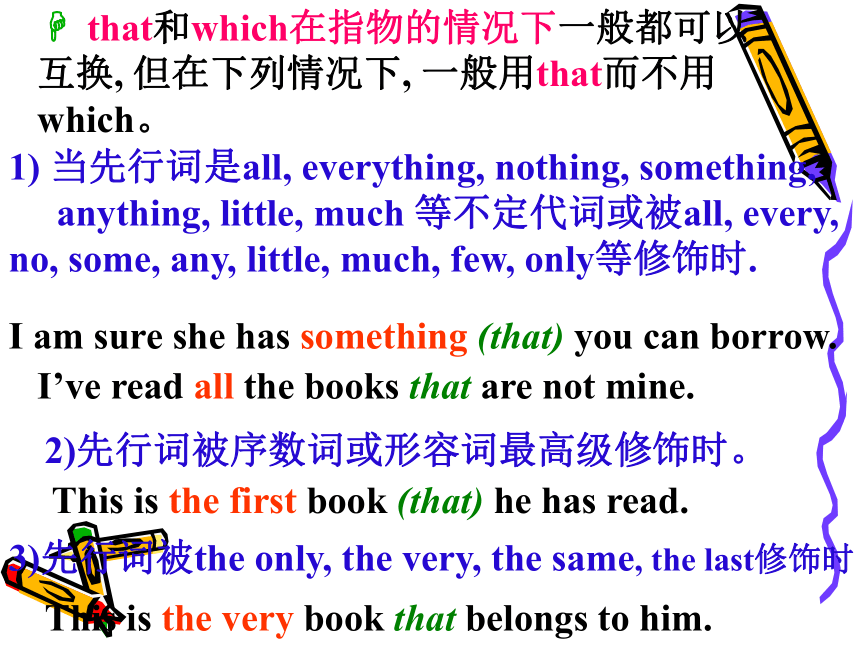

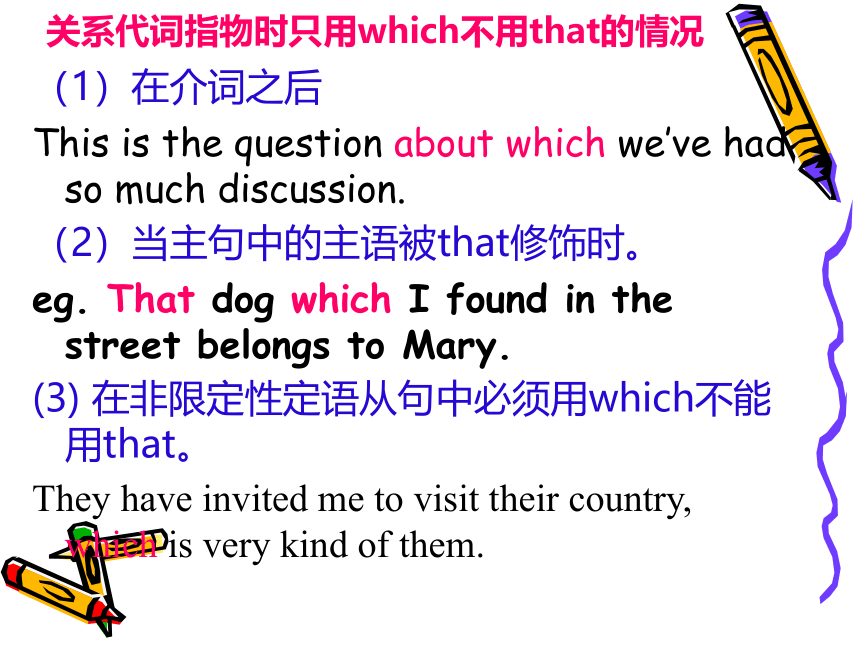
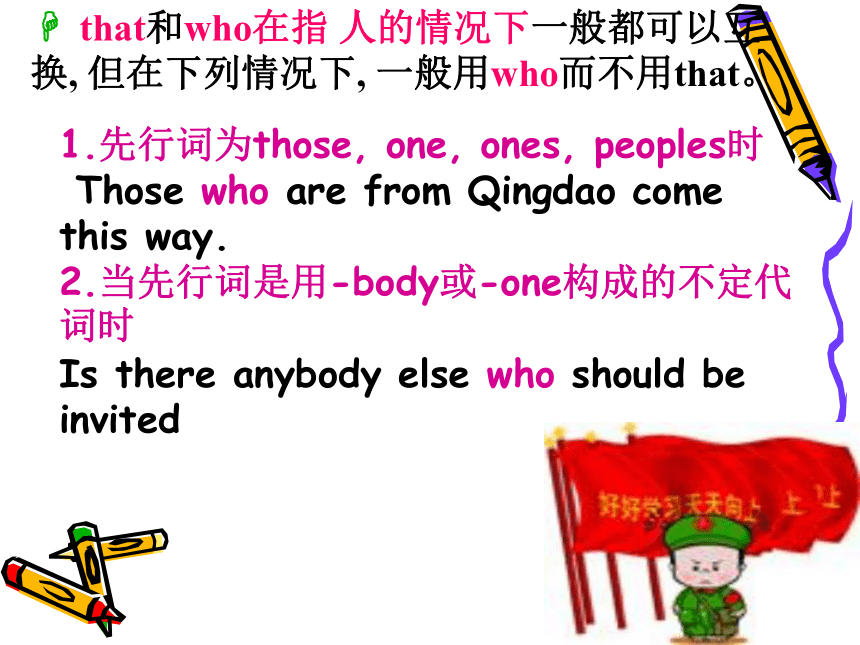
文档简介
课件45张PPT。复习定语从句复习关系代词和关系副词主宾定人:物(时/地/原):人:物(时/地/原):物(时/地/原):人:who,thatwhich,thatwhom,who,that,--which,that,--whose状时间:地点:原因:= + whenwherewhy介词which1.The man lives next door is a writer.
2.The woman I visited last week is a famous writer.
3. Beijing is the city has got the chance to host the 2008 Olympic Games.
4. A dictionary is a book you can use to learn more words.
5. The little boy eyes are blue is holding a dog.
6. The house roof was blown away by the storm will be rebuilt soon. who / thatwho / whom / that/-which / that which / that/-whosewhosewhenI began to work in Beijing in the year ______New China was founded.
Do you know the reason ____ he didn’t come? why9. I can’t remember the place _________I put my book.where复习巩固:用适当的关系词填空一、定语从句的定义:
用来修饰名词或代词的从句叫定语从句。被定语从句所修饰的名词或代词叫先行词(antecedent)。定语从句一般是由关系代词或关系副词来引导的。相当于名词和形容词的作用。
eg: 1. Do you know the man who came to see Xiao Yang this morning?
2.The day is not far off when we will make a trip to Britain.定语从句归纳总结二、关系代词和关系副词的作用:
1、引导作用
2、替代作用
3、在定语从句中担当某个成分的作用
eg: 1.Those who want to go please sign your names here.
2.This is the house where he was born.
3. Bill, who was here yesterday, asked me a lot of questions.关系代词的用法关系代词在从句中可以:whomwhowhichthatwhose√√√√√√√√√√√√√√√何时可以省略?做宾语时可以省略关系副词的用法指代所做成分是否可省略whentimeadverbial(状语)nowhereplaceadverbialnowhyreasonadverbialno关系副词 ? that和which在指物的情况下一般都可以互换, 但在下列情况下, 一般用that而不用which。I am sure she has something (that) you can borrow.I’ve read all the books that are not mine. This is the first book (that) he has read.This is the very book that belongs to him.1) 当先行词是all, everything, nothing, something,
anything, little, much 等不定代词或被all, every, no, some, any, little, much, few, only等修饰时.2)先行词被序数词或形容词最高级修饰时。3)先行词被the only, the very, the same, the last修饰时先行词是who或who引导的主句。
Who is the girl that drove the car? Who that broke the window will be punished.
(6) 主句以There be 引导时 There are 200 people that didn’t know the thing.
(7) 当先行词在定语从句中作be表语時,关系代词用that.
She isn’t the girl that she was 10 years ago.
(8)当先行词是which时,关系代词用that.
Which is the book that you bought last week?
(4)当先行词既有人又有物时, 用关系代词thatWe were deeply impressed by the teachers
and the schools that we had visited there.关系代词指物时只用which不用that的情况(1)在介词之后
This is the question about which we’ve had so much discussion.
(2)当主句中的主语被that修饰时。
eg. That dog which I found in the street belongs to Mary.
(3) 在非限定性定语从句中必须用which不能用that。
They have invited me to visit their country, which is very kind of them. ? that和who在指 人的情况下一般都可以互换, 但在下列情况下, 一般用who而不用that。1.先行词为those, one, ones, peoples时
Those who are from Qingdao come this way.
2.当先行词是用-body或-one构成的不定代词时
Is there anybody else who should be invited
关系副词when, where, why的用法 关系副词都等于一个适当的介词+which,在从句中作状语
When=in/at/on/during…+which;
Where=in/at/on/…+which;
Why=for +which 1.Do you still remember the day when(on which) we went to visit the museum together?
2.This is the factory where(in which)my father once worked.
3.This is the reason why(for which) he was late.A.
I know a place where we can have a picnic.I know a place which / that is famous for its beautiful natural scenery. Compare :关系代词和关系副词在定语从句中的不同成分(注意事项)B.
I will never forget the days when we spent our holidays together. I will never forget the days that / which we spent
together. C.
This is the reason why he was dismissed.This is the reason that / which he explained to me for
his not attending the meeting.注意:关系代词放在介词后面,只能用which或whom
a.This is the boy with whom he worked.
b.This is the boy whomhe worked with.
c. This is the boy who he worked with.
d. This is the boy he worked with.
e. The house where we live is not large.
f. The house in which we live is not large.
g. The house which we live in is not large.
h. The house we live in is not large. as 从句的先行词是the same, such, 或被他们所修饰;在从句中做主语或宾语;多用于表示肯定意义的从句中,不用于表否定意义的从句中。
e.g. Many of the sports are the same as they were when they started.
The result was not such as he expected.
It was raining hard, which / as was unexpected.
常用于as is known to all, as you know, as is expected,the same…as, such…as, as…as, so…as 句型中,as不可省略… 1.Such people as you describe are rare nowadays.
2.Let’s discuss only such questions as concern every one of us.
3.Would you please buy me the same novel as you bought for brother yesterday, Mum?
4. As we all know, John is an honest man.
比较:
She wore the same dress that she wore at Marry’s wedding. Which 和as 在引导非限定性定语从句时可以指代一件事, 如:
The gentleman admired Mrs. Brown, which surprised me.
As we had expected, his performance was excellent.
在这时as可以在句首, which 不可以; as 有正如的意思, 而which 没有。 Grammer限制性定语从句与非限制性定语从句限制性定语从句和非限制性定语从句之间的区别起限制性作用,指特定的人或物,不可省略,否则原句不完整紧跟先行词,与先行词之间没有逗号 修饰先行词关系代词关系副词及that
一般译为定语从句仅作补充说明,若省,原句意思不变用逗号与主句隔开修饰先行词或整个句子关系代词关系副词可译为并列分句限制性定语从句和非限制性定语从句 1.限制性定语从句是先行词在意义上不可缺少的定语,如果去掉,主句的意思就不完整或失去意义。这种从句和主句的关系十分密切,写时不用逗号分开。限制性定语从句中作宾语的关系代词常可省略。
如:
a) What is the name of the tall woman who is standing there?
站在那边的那个女人叫什么名字?
b) Toronto is a city (that) I' ve always wanted to visit.
多伦多是我常想去参观的一个城市。2.非限制性定语从句和主句关系不十分密切,只是对先行词作些附加的说明, 如果去掉, 主句的意思仍然清楚。这种从句和主句之间往往用逗号分开,一般不用that引导。非限制性定语从句中,关系词不可省略。如:
a) Rome, which is the capital of Italy, has a very long history.
意大利的首都罗马历史非常悠久。
b) Yesterday I met Professor King, who came from the University of London.
昨天我遇见金教授,他从伦敦大学来的。
c) He lent me a dictionary, which was just what I needed.
他借给我一本词典,这正是我所需要的。3.大多数限制性和非限制性定语从句的先行词往往为某一个词或短语,而特殊场合非限制性定语从句的先行词也可为整个主句,此时非限制性定语从句常由which引导。
eg. A middle-aged woman killed her husband, which frightened me very much.
一个中年女子杀害了其丈夫,这事令我十分恐惧。
析:从语境可知,令我恐惧的内容应为中年女子杀害了其丈夫这整个一件事,因此先行词为整个主句,此时应由which引导定语从句。
eg. A five-year-old boy can speak two foreign languages, which surprises all the people present.
一个五岁的男孩会讲两门外语,令所有在场的人感到非常惊讶。
析:从语境可知,令所有在场的人感到惊讶的内容是一个五岁男孩会讲两门外语这整个一件事,因此先行词为整个主句,此时应由which引导非限制性定语从句。
1. Some of the roads were flooded, made our journey more difficult.
2. He has smoothly entered a key middle school, makes his parents very happy.
3. Mr King, legs were badly hurt, was quickly taken to hospital.
5. We shall make a decision about Ms King, story I have just told you.
6. He made the same mistakes again, _____ made his parents very angry.
7. Yesterday I bought a dictionary, ______ cost me more than 100 yuan .
8. Mr Smith, ____ gave a talk several months ago,will come again.
9. My uncle has come back from abroad, ______ I haven’t met for along time.whichwhichwhosewhosewhichwhichwhowhom练习Her brother, who is now a soldier, always encourages her
to go to college.她哥哥是当兵的,他总是鼓励她上大学。(意含: 她只有一个哥哥。)2. All the books that have pictures in them are well written.所有里面带插图的书都写得很好。(意含: 不带插图的书则不一定写得好。)All the books, which have pictures in them, are well written.所有的书都带插图,这些书都写得很好。(意含: 没有不带插图的书。)比较:
a) She has two brothers who are working in the city.
She has more than two brothers.
她有两个弟弟在这个城市工作。
b) She has two brothers, who are working in the city.
She has only two brothers.
她有两个弟弟,他们在这个城市工作。
下面两个句子只有一个逗号之差,意义大相径庭。
a) He will wear no clothes which will make him different from others.
他不会穿一些使他显得与众不同的衣服。
b) He will wear no clothes, which will make him different from others.
他不穿衣服,这会使他显得与众不同。
as和which引导非限制性定语从句的区别句首/句中
句中正如,像这√×1. She was always speaking highly of her role in the play, of course, _____ made the others unhappy.
A. which B. who C. this
D. what2. After living in Paris for fifty years he returned to the small town _______ he grew up as a child.
A. which B. when C. that D. where3. The gentleman _______ you told me yesterday proved to be a thief.
A. who B. about whom C. whom D. with whom4. Please take any seat ____ is free.
A. which B. where C. in which D. that5. The old man has two sons, _______ is a soldier.
A. one of whom B. both of them C. all of whom D. none of them6. New York is famous for its sky-scrapers(摩天大楼)_____ has more than 100 storeys.
A. the higher of them B. the highest of which
C. the highest of them D. some of which7. My home village is no longer the same _____ it used to be.
A. which B. as C. where D. when8. In the office I never seem to have time until after 5:30 p.m., ______ many people have gone home.
A. whose time B. that C. at which D. by which time9. The boy ______ composition won the first prize is the youngest in the group.
A. who B. whose C. that
D. which10. The weather turned out to be very good, ______ was more than we could expect.
A. what B. which C. that D. it猜猜看,下面的句子明白了吗?
1.不懂装懂,一事无成.
He who knows nothing but pretends to know everything , is indeed a good-for-nothing.
2.甘当小绵羊,迟早要喂狼.
He that makes himself a sheep shall be eaten by the wolf.
3.万事开头难
It’s the first step that costs.
4.千里之行,始于足下。
He who would climb that ladder must begin at the bottom.
5.自满的人腹中空.
He who is full of himself is very empty.
6.闪光的未必都是金子
Not all that glitters is gold.
Goodbye!
2.The woman I visited last week is a famous writer.
3. Beijing is the city has got the chance to host the 2008 Olympic Games.
4. A dictionary is a book you can use to learn more words.
5. The little boy eyes are blue is holding a dog.
6. The house roof was blown away by the storm will be rebuilt soon. who / thatwho / whom / that/-which / that which / that/-whosewhosewhenI began to work in Beijing in the year ______New China was founded.
Do you know the reason ____ he didn’t come? why9. I can’t remember the place _________I put my book.where复习巩固:用适当的关系词填空一、定语从句的定义:
用来修饰名词或代词的从句叫定语从句。被定语从句所修饰的名词或代词叫先行词(antecedent)。定语从句一般是由关系代词或关系副词来引导的。相当于名词和形容词的作用。
eg: 1. Do you know the man who came to see Xiao Yang this morning?
2.The day is not far off when we will make a trip to Britain.定语从句归纳总结二、关系代词和关系副词的作用:
1、引导作用
2、替代作用
3、在定语从句中担当某个成分的作用
eg: 1.Those who want to go please sign your names here.
2.This is the house where he was born.
3. Bill, who was here yesterday, asked me a lot of questions.关系代词的用法关系代词在从句中可以:whomwhowhichthatwhose√√√√√√√√√√√√√√√何时可以省略?做宾语时可以省略关系副词的用法指代所做成分是否可省略whentimeadverbial(状语)nowhereplaceadverbialnowhyreasonadverbialno关系副词 ? that和which在指物的情况下一般都可以互换, 但在下列情况下, 一般用that而不用which。I am sure she has something (that) you can borrow.I’ve read all the books that are not mine. This is the first book (that) he has read.This is the very book that belongs to him.1) 当先行词是all, everything, nothing, something,
anything, little, much 等不定代词或被all, every, no, some, any, little, much, few, only等修饰时.2)先行词被序数词或形容词最高级修饰时。3)先行词被the only, the very, the same, the last修饰时先行词是who或who引导的主句。
Who is the girl that drove the car? Who that broke the window will be punished.
(6) 主句以There be 引导时 There are 200 people that didn’t know the thing.
(7) 当先行词在定语从句中作be表语時,关系代词用that.
She isn’t the girl that she was 10 years ago.
(8)当先行词是which时,关系代词用that.
Which is the book that you bought last week?
(4)当先行词既有人又有物时, 用关系代词thatWe were deeply impressed by the teachers
and the schools that we had visited there.关系代词指物时只用which不用that的情况(1)在介词之后
This is the question about which we’ve had so much discussion.
(2)当主句中的主语被that修饰时。
eg. That dog which I found in the street belongs to Mary.
(3) 在非限定性定语从句中必须用which不能用that。
They have invited me to visit their country, which is very kind of them. ? that和who在指 人的情况下一般都可以互换, 但在下列情况下, 一般用who而不用that。1.先行词为those, one, ones, peoples时
Those who are from Qingdao come this way.
2.当先行词是用-body或-one构成的不定代词时
Is there anybody else who should be invited
关系副词when, where, why的用法 关系副词都等于一个适当的介词+which,在从句中作状语
When=in/at/on/during…+which;
Where=in/at/on/…+which;
Why=for +which 1.Do you still remember the day when(on which) we went to visit the museum together?
2.This is the factory where(in which)my father once worked.
3.This is the reason why(for which) he was late.A.
I know a place where we can have a picnic.I know a place which / that is famous for its beautiful natural scenery. Compare :关系代词和关系副词在定语从句中的不同成分(注意事项)B.
I will never forget the days when we spent our holidays together. I will never forget the days that / which we spent
together. C.
This is the reason why he was dismissed.This is the reason that / which he explained to me for
his not attending the meeting.注意:关系代词放在介词后面,只能用which或whom
a.This is the boy with whom he worked.
b.This is the boy whomhe worked with.
c. This is the boy who he worked with.
d. This is the boy he worked with.
e. The house where we live is not large.
f. The house in which we live is not large.
g. The house which we live in is not large.
h. The house we live in is not large. as 从句的先行词是the same, such, 或被他们所修饰;在从句中做主语或宾语;多用于表示肯定意义的从句中,不用于表否定意义的从句中。
e.g. Many of the sports are the same as they were when they started.
The result was not such as he expected.
It was raining hard, which / as was unexpected.
常用于as is known to all, as you know, as is expected,the same…as, such…as, as…as, so…as 句型中,as不可省略… 1.Such people as you describe are rare nowadays.
2.Let’s discuss only such questions as concern every one of us.
3.Would you please buy me the same novel as you bought for brother yesterday, Mum?
4. As we all know, John is an honest man.
比较:
She wore the same dress that she wore at Marry’s wedding. Which 和as 在引导非限定性定语从句时可以指代一件事, 如:
The gentleman admired Mrs. Brown, which surprised me.
As we had expected, his performance was excellent.
在这时as可以在句首, which 不可以; as 有正如的意思, 而which 没有。 Grammer限制性定语从句与非限制性定语从句限制性定语从句和非限制性定语从句之间的区别起限制性作用,指特定的人或物,不可省略,否则原句不完整紧跟先行词,与先行词之间没有逗号 修饰先行词关系代词关系副词及that
一般译为定语从句仅作补充说明,若省,原句意思不变用逗号与主句隔开修饰先行词或整个句子关系代词关系副词可译为并列分句限制性定语从句和非限制性定语从句 1.限制性定语从句是先行词在意义上不可缺少的定语,如果去掉,主句的意思就不完整或失去意义。这种从句和主句的关系十分密切,写时不用逗号分开。限制性定语从句中作宾语的关系代词常可省略。
如:
a) What is the name of the tall woman who is standing there?
站在那边的那个女人叫什么名字?
b) Toronto is a city (that) I' ve always wanted to visit.
多伦多是我常想去参观的一个城市。2.非限制性定语从句和主句关系不十分密切,只是对先行词作些附加的说明, 如果去掉, 主句的意思仍然清楚。这种从句和主句之间往往用逗号分开,一般不用that引导。非限制性定语从句中,关系词不可省略。如:
a) Rome, which is the capital of Italy, has a very long history.
意大利的首都罗马历史非常悠久。
b) Yesterday I met Professor King, who came from the University of London.
昨天我遇见金教授,他从伦敦大学来的。
c) He lent me a dictionary, which was just what I needed.
他借给我一本词典,这正是我所需要的。3.大多数限制性和非限制性定语从句的先行词往往为某一个词或短语,而特殊场合非限制性定语从句的先行词也可为整个主句,此时非限制性定语从句常由which引导。
eg. A middle-aged woman killed her husband, which frightened me very much.
一个中年女子杀害了其丈夫,这事令我十分恐惧。
析:从语境可知,令我恐惧的内容应为中年女子杀害了其丈夫这整个一件事,因此先行词为整个主句,此时应由which引导定语从句。
eg. A five-year-old boy can speak two foreign languages, which surprises all the people present.
一个五岁的男孩会讲两门外语,令所有在场的人感到非常惊讶。
析:从语境可知,令所有在场的人感到惊讶的内容是一个五岁男孩会讲两门外语这整个一件事,因此先行词为整个主句,此时应由which引导非限制性定语从句。
1. Some of the roads were flooded, made our journey more difficult.
2. He has smoothly entered a key middle school, makes his parents very happy.
3. Mr King, legs were badly hurt, was quickly taken to hospital.
5. We shall make a decision about Ms King, story I have just told you.
6. He made the same mistakes again, _____ made his parents very angry.
7. Yesterday I bought a dictionary, ______ cost me more than 100 yuan .
8. Mr Smith, ____ gave a talk several months ago,will come again.
9. My uncle has come back from abroad, ______ I haven’t met for along time.whichwhichwhosewhosewhichwhichwhowhom练习Her brother, who is now a soldier, always encourages her
to go to college.她哥哥是当兵的,他总是鼓励她上大学。(意含: 她只有一个哥哥。)2. All the books that have pictures in them are well written.所有里面带插图的书都写得很好。(意含: 不带插图的书则不一定写得好。)All the books, which have pictures in them, are well written.所有的书都带插图,这些书都写得很好。(意含: 没有不带插图的书。)比较:
a) She has two brothers who are working in the city.
She has more than two brothers.
她有两个弟弟在这个城市工作。
b) She has two brothers, who are working in the city.
She has only two brothers.
她有两个弟弟,他们在这个城市工作。
下面两个句子只有一个逗号之差,意义大相径庭。
a) He will wear no clothes which will make him different from others.
他不会穿一些使他显得与众不同的衣服。
b) He will wear no clothes, which will make him different from others.
他不穿衣服,这会使他显得与众不同。
as和which引导非限制性定语从句的区别句首/句中
句中正如,像这√×1. She was always speaking highly of her role in the play, of course, _____ made the others unhappy.
A. which B. who C. this
D. what2. After living in Paris for fifty years he returned to the small town _______ he grew up as a child.
A. which B. when C. that D. where3. The gentleman _______ you told me yesterday proved to be a thief.
A. who B. about whom C. whom D. with whom4. Please take any seat ____ is free.
A. which B. where C. in which D. that5. The old man has two sons, _______ is a soldier.
A. one of whom B. both of them C. all of whom D. none of them6. New York is famous for its sky-scrapers(摩天大楼)_____ has more than 100 storeys.
A. the higher of them B. the highest of which
C. the highest of them D. some of which7. My home village is no longer the same _____ it used to be.
A. which B. as C. where D. when8. In the office I never seem to have time until after 5:30 p.m., ______ many people have gone home.
A. whose time B. that C. at which D. by which time9. The boy ______ composition won the first prize is the youngest in the group.
A. who B. whose C. that
D. which10. The weather turned out to be very good, ______ was more than we could expect.
A. what B. which C. that D. it猜猜看,下面的句子明白了吗?
1.不懂装懂,一事无成.
He who knows nothing but pretends to know everything , is indeed a good-for-nothing.
2.甘当小绵羊,迟早要喂狼.
He that makes himself a sheep shall be eaten by the wolf.
3.万事开头难
It’s the first step that costs.
4.千里之行,始于足下。
He who would climb that ladder must begin at the bottom.
5.自满的人腹中空.
He who is full of himself is very empty.
6.闪光的未必都是金子
Not all that glitters is gold.
Goodbye!
